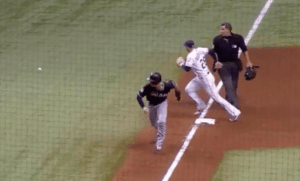Outfielder’s Throw is Deflected into Dead Ball Territory
Whenever a thrown, pitched, or batted ball is deflected into dead ball territory, umpires must be able to make the proper base award and coaches should be able to determine if the base award was proper. This can impact the outcome of a game.
Thrown Ball Deflected into Dead Ball Territory
Take what occurred when the Miami Marlins and Tampa Bay Rays played at the Trop on July 20, 2018.
Miami broke open a five-run lead in the seventh. Following Derek Dietrich’s one-out, three-run homer, Brian Anderson walked before J.T. Realmuto smashed a double to left field off the wall. Rays’ left fielder Jake Bauers had difficulty handling the ball before he picked it up and fired to shortstop Adeiny Hechavarria, who booted the ball to third baseman Daniel Robertson, who in turn, accidentally kicked it into the camera well. The only throw made on the play was by Bauers.
Both Anderson and Realmuto were awarded home. The two runs were critical as the Marlins won the game, 6-5.
To see the play, click the link:

JT Realmuto scores on a “Little League” home run
https://www.mlb.com/video/realmutos-odd-little-league-hr/c-2288842083?tid=6479266
Did the umpires handle the play properly? No!
Rule 5.06 (b) (4) (H) in the Official Baseball Rules and Sections 19 and 20 of the 2018 MLB Umpire Manual covers deflections and awarding of bases. The MLB Umpire Manual states, “If a thrown ball goes through or by a fielder, remains on the playing field and is subsequently kicked or deflected out of play (unintentionally in either case), the award is two bases from the time of the throw.” The rule is universal.
Notice the rule states the base award for the runner/s is made from the time of the throw, not from the time of the deflection(s). As for awarding bases on deflected throws, it is treated as if the ball was never touched or deflected. Umpires must determine the position of the runner/s at the moment the ball is released by the fielder (Bauers). The runner(s) are awarded two bases from their position on the bases meaning the last base that was legally touched. If a ball is intentionally deflected out of the play, runners are then awarded two bases from their position on the bases at the moment of deflection.
If you watch the video provided by MLB.com, assuming everything is in proper sequence, you will notice that Realmuto had not reached second base before Bauers released the ball to Hechavarria. Therefore, Realmuto should have been placed at third base because the last base he legally occupied before the throw was first base. Instead, he was allowed to score which proved to be the winning run.
In the past, I have recommended that someone in the dugout should be responsible for watching the position of the runners when the ball is released from the outfielder’s hand. The Rays had a good argument to keep Realmuto at third but failed to take advantage of it. Umpires and coaches should observe the position of the base runners the moment the ball is released by the outfielder. Normally, the plate umpire can make the base award because he is in position to see the whole play.
On all levels of baseball, it is natural for everyone in the park to focus on the baseball, while unaware of what is going on in the under belly of the play. In the above play, too many eyes, including the umpires, were fixated on the ball while ignoring the position of the runners at the moment the ball was released by the fielder. The lack of attention to Realmuto’s position on the bases when the ball was released by Bauers, certainly impacted the outcome of the game since the Marlins won by one run.

